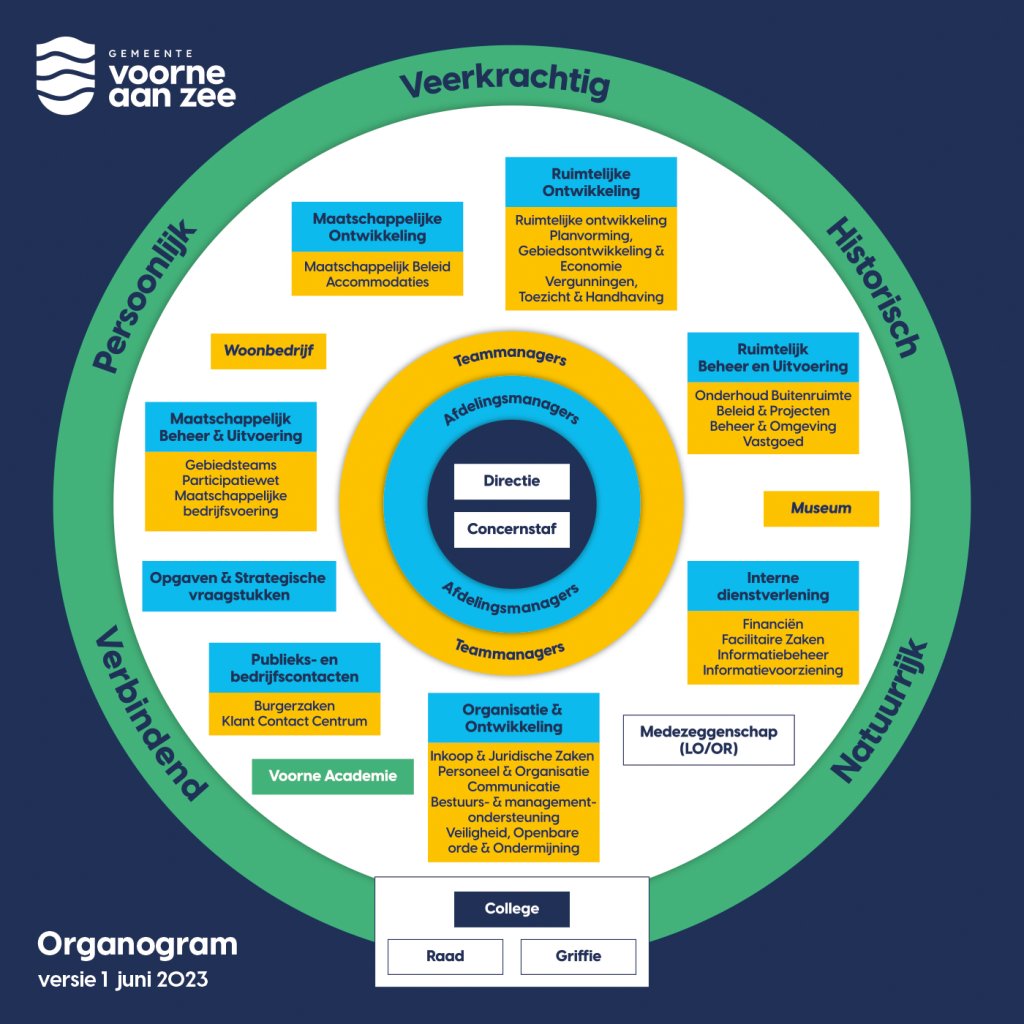Organization Chart

This organizational chart shows the internal structure of our organization. The shape of the organizational chart shows that as an organization we are "outward-looking. Personal, resilient, historical, natural and connecting are important values in this regard. Both for our congregation and our organization. The circle, as the basis of the organization chart, shows the agility, dynamism and mobility of the organization.
Read more about the different organizational units here.
Our environment and our values
As an organization, we are focused "outward. We do our work in a water-rich environment and are the garden of the region with a nature-rich green character. Personal, resilient, historical, nature-rich and connecting are important values for our municipality and our organization. This is made visible in the outer green ring of the organizational chart. The circle as the basis for the organizational chart shows the agility, dynamism and mobility of the organization.
Departments
The civil service organization consists of eight departments:
- Internal Services
- Social Management & Implementation
- Social Development
- Organization & Development
- Public and Corporate Contacts
- Spatial Management and Implementation
- Spatial Development
- Issues & Strategic Issues
Teams
Teams have been formed within each department. In total, there are 27 teams:
- Procurement & Legal Affairs
- Personnel & Organization
- Communications
- Board and management support
- Security, Public Order & Undermining
- Finance
- Facility Affairs
- Information Management
- Information
- Maintenance Outdoor Space
- Policy & Projects
- Management & Environment
- Property
- Spatial Development
- Planning, Area Development & Economy
- Licensing, Supervision & Enforcement
- Social Policy
- Accommodations
- Area teams (3)
- Participation Act
- Social management
- Civil Affairs
- Customer Contact Center
There are also two more corporate teams:
- Museum
- Woonbedrijf
College, council and Municipal Clerk’s Office
- The college is the authority for the civil service organization and is responsible for general management.
- The municipal council is the highest governing body in the municipality. The council indicates what should be done in a municipality and oversees the work of the Board of Mayor and Aldermen.
- The Municipal Clerk’s Office Office supports council members in all its duties and encourages the council's dual mode of operation.
Management and corporate staff
The Executive Board consists of the City Clerk/General Manager, the Corporate Director for Business Development (internal orientation) and the Corporate Director for Strategy/Vision (external orientation). The town clerk/general manager is responsible for a number of statutory duties and powers. He also directs the official organization. He does this in consultation with the corporate directors. The tasks are divided by mutual agreement.
In addition, there is a corporate staff. This consists of: the group controller, a number of internal control functions, the executive secretary and the organizational consultant.
Department and team managers
In addition to the management board, the official organization also has the following types of managers: department managers and team managers. Together they ensure that the organization functions efficiently, effectively and lawfully and realizes set goals and assigned work.
Voorne Academy
The Voorne Academy was established as a learning and development platform for and by employees of the new municipality of Voorne aan Zee.
Learning and development according to Daniel Ofman's Ik-Wij-Het model. This is an integral approach in which the personal aspects (I), the relationship with others (we) and the content and environment (it) are linked. The learning and development offerings consist of offerings on these different dimensions.
Participation
Works Council
The works council (OR) is an independent body with its own powers. They represent the workforce. It is a participation and co-determination body and consists of employees elected on behalf of the staff. The OR consults with the employer/WOR director on company policy and staff interests.
Local Consultation
Local consultation (LO) takes place between the employer and unions. The topics concern the introduction, amendment or repeal of local regulations/provisions involving money, e.g. the conversion table for job evaluation and remuneration, travel expenses reimbursement for commuting and sources/goals Individual Choice Budget (IKB). In addition, agreements are made about a social statute/plan.